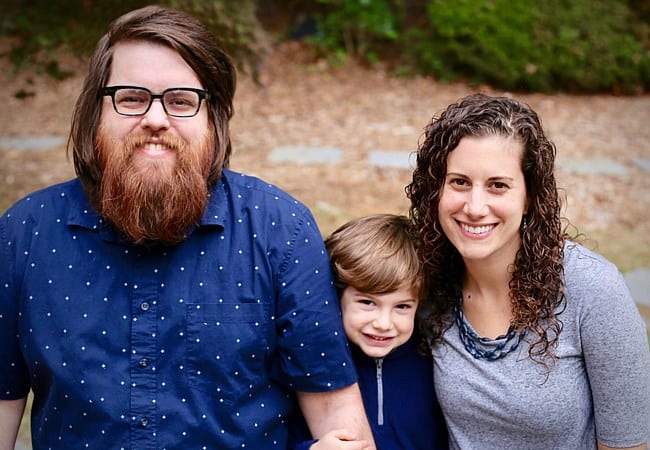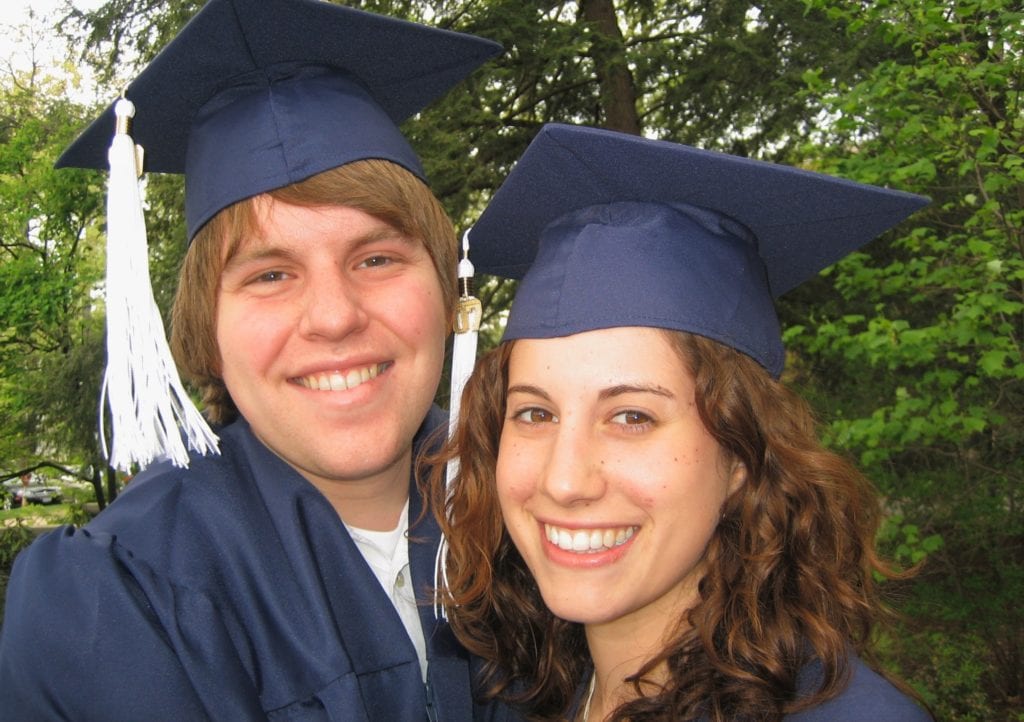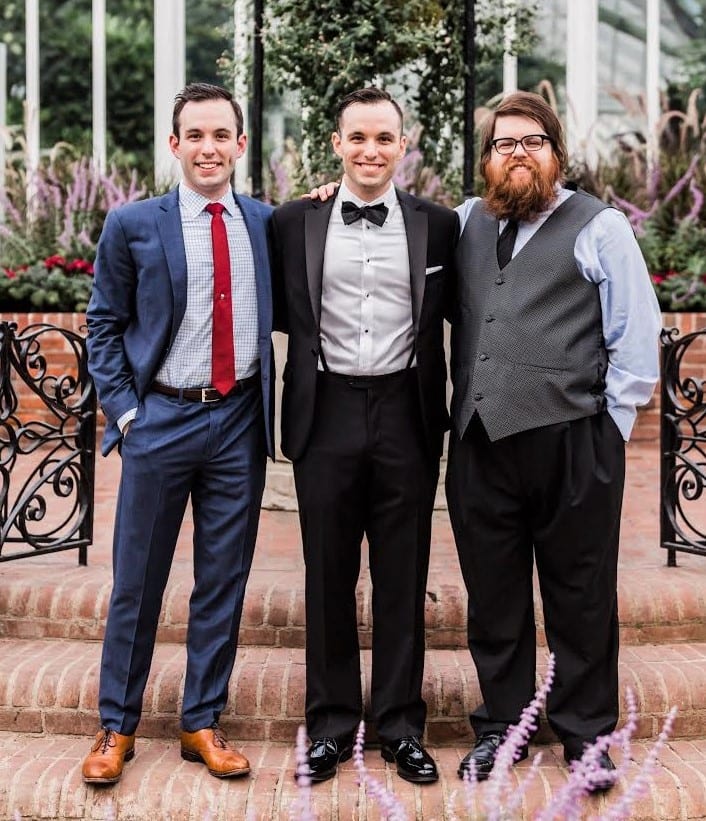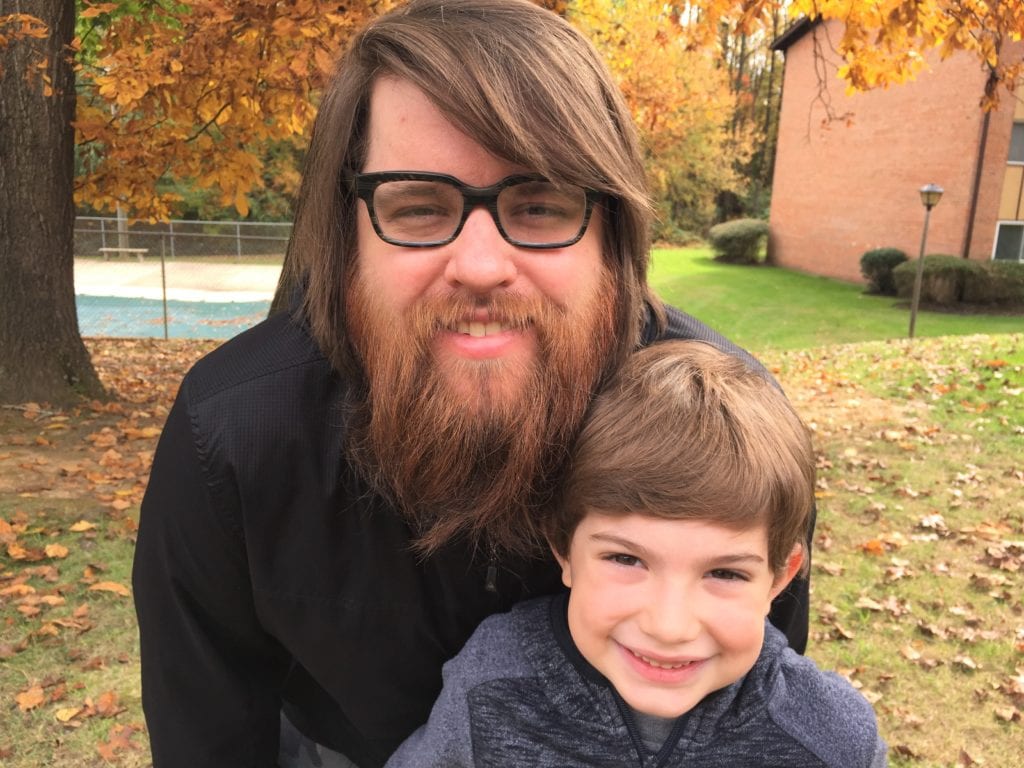
Greg Boros delighted in his wife, Elise, and their son, Paul. Photo provided

Greg Boros delighted in his wife, Elise, and their son, Paul. Photo provided
It was a crisp autumn morning as Penn State senior Greg Boros rode his bicycle to class on Monday, October 16, 2006. Perhaps the student from western Pennsylvania was thinking about his beloved Pittsburgh Steelers. Or maybe his mind was on his growing faith in God. Or his anticipated graduation in May and marriage to State College native Elise Hagen in June.
Life changed for Boros, however, in a heartbeat that didn’t occur. With no warning, he lost consciousness and his bike crashed to the ground near Sparks Building. Other students rushed to his aid, administering CPR and calling 911. Emergency medical personnel arrived minutes later, and they restarted his heart through automated external defibrillation.
Next came an ambulance ride to Mount Nittany Medical Center for evaluation and initial treatment. And then Boros was flown by helicopter to Allegheny General Hospital in Pittsburgh.
Several days later, The Daily Collegian reported that the communications major had greatly improved. His heart was thought to be in good condition and he was able to communicate with friends and loved ones.
“He just wanted to make sure that people weren’t worried about him,” recalls Tyler Kerr, one of a group of Boros’ Penn State friends who drove to Pittsburgh to offer support.
Doctors at Allegheny General implanted a defibrillator near the heart of their 21-year-old patient, and they hoped it would prevent similar incidents for the rest of his life. Unfortunately, the doctors were wrong, and it took several more years for medical people to accurately diagnose his rare heart problem.
By the time Boros lost his life just before this past Christmas, he had endured a dreadful assortment of medications, therapies and surgeries—most notably a heart transplant on November 25, 2010. Yet, his life also overflowed with the joys of being married to Elise, raising their son Paul and telling others about the love of Jesus through campus ministry. Says Nate Boros, one of Greg’s three younger brothers, “Greg experienced the very best and the very worst of what life has to offer.”
The Greg Boros story is relevant to Happy Valley residents since he spent eight of his 35 years in this community and since his young widow is a dyed-in-the-wool townie. And given my limited but meaningful friendship with Greg, I believe his story offers hope to people anywhere, especially those who face major adversities.
ENTERING INTO MARRIAGE
Despite the uncertainties left by Boros’ collapse in October of 2006, he proceeded with his plans. He graduated on May 19, 2007 (some guy named Anthony Fauci received an honorary doctorate that same day from Penn State). He married Elise on June 24 in a ceremony at State College’s Grace Lutheran Church. And then, at the beginning of 2008, the new couple joined the staff of Cru, the interdenominational Christian ministry that had boosted their spiritual lives as students.
The Boros’ relationship began as a spiritually-focused courtship on the Penn State campus. “We met right after he became a follower of Jesus in the spring of 2004,” notes Elise, “but I didn’t get to know him until the next fall.
“People at PSU who knew Greg in high school would warn me that I shouldn’t date him because of who he’d been. But I always was drawn to his authentic faith and how much Jesus had transformed his life. From the beginning, being around him just felt like ‘home.’”
Greg demonstrated a unique, sacrificial commitment to Elise. According to Josh Kerr, the younger brother of Tyler and another close friend of the couple, “The whole time they were dating, he would never let her walk to her dorm building alone at night. Even if she was studying until 3 a.m., she would call him and he would get up, walk across campus from his house on Park Avenue, get her to her dorm and then walk home. He was selfless, caring for her and sacrificing for her.”

NEEDING A TRANSPLANT
Greg and Elise enjoyed their first staff assignment with Cru, communicating the message of Christ to students at George Mason University in Fairfax, Virginia. But even though their work was fulfilling, Greg had to battle symptoms of a heart condition that still wasn’t clearly diagnosed.
“At one point,” recalls Tyler Kerr, “a doctor told Greg that if they figured it out, they might name it after him. It was an electrical issue with his heart, but they weren’t sure if it was genetic.”
Sadly, Boros needed more advanced medical procedures as his heart weakened. Doctors utilized extreme diuretic therapy to remove fluids from around his heart. And to better understand Greg’s mysterious condition, they utilized cardiac catheterizations and a specialized stress test in addition to his implantable cardioverter defibrillator (ICD). Still, in 2009 they made a faulty diagnosis that led to a useless open heart surgery.
By January of 2010, Greg’s continuing decline led doctors at INOVA Fairfax Hospital to begin planning for a heart transplant. Not yet 25, Boros had to accept the fact that he would die without a new heart and that he would die young even with one. According to Elise, “Greg struggled with depression, hopelessness, anger, jealousy—everything that rises to the surface when you are young and dying and no one else around you is.”
After nearly a year in waiting for a heart, Greg underwent transplant surgery on a significant date—November 25, 2010, Thanksgiving Day. An All-State Chorus member during his days at Seneca Valley High School, he sang “Rock of Ages” as the anesthesia put him to sleep.
Fortunately, the operation was successful, Greg’s new heart was beating within him by 1 a.m. on the 26th, and Elise was ecstatic. “Greg is doing great,” she wrote in a group email, “and we cannot wait to see him and tell him that this long ordeal is finally over!”
RETURNING TO STATE COLLEGE
Despite post-surgical kidney failure and several times when his new heart was in danger of rejection, Greg gained strength. Slowly but steadily, his overall health improved. After several years, he was ready for his dream job if his doctors gave their approval.
Approve they did—if Greg promised to return periodically to Fairfax for a biopsy. And so, Greg and Elise returned to Happy Valley. For Elise, of course this meant coming home to favorite places like Sunset Park, Jo Hays Vista and Meyer Dairy. For Greg, it meant a chance to direct the Cru ministry on the campus he loved.
And State College was a great community for Greg, an energetic place where his larger-than-life personality fit in nicely. He was the guy who wore flip flops almost all year and allowed an abundance of reddish hair to spill out from under his bandana. He had a big voice, a brilliant mind and a remarkable capacity to be totally and refreshingly himself.
So what was it like to be around a refreshingly Greg Boros? Well, imagine it’s the fall of 2004, and you’re eating lunch at Penn State’s Redifer Commons with Greg and several other students. With the Penn State football team en route to a 4-7 record, football talk focuses on the NFL. Everyone thinks the Steelers and Eagles will meet in the Super Bowl, and of course, the campus is passionately divided between Yinzers and Yousers.
“Suddenly,” Tyler Kerr says, “Graham Spanier walks in to get a sandwich. And one of us joked, ‘Hey, I wonder who Graham Spanier is rooting for. The Steelers or the Eagles?’ But no one was going to walk up to the president of the university and ask him, right? Well, Greg stood up and walked over to Spanier. And we’re all sitting there with our hands over our mouths like, ‘Is he really doing this?’ We couldn’t hear the conversation, but then we heard Greg go, ‘Yessss!’ at the top of his lungs, right in front of the president of the university. And Greg came back to us and said, ‘He’s rooting for the Steelers!’”

CARING FOR OTHERS
If ever a person had reason to turn inward with bitterness, Greg Boros was that person. Not only did he face a painful and life-altering medical condition, but he was abused as a child and put down as a middle school student.
“As someone who struggled with his weight at a younger age, Greg experienced some ostracism in middle school,” Nate says. “He later developed strong social connections in high school through chorus and theater, but he was picked on in middle school.”
Yet despite a devastating childhood and painful adolescence, Greg somehow focused on the needs of others. It was a key trait for his ministry, as Tyler Kerr observed on one memorable occasion.
“After Greg’s transplant,” Kerr says, “we were talking with a kid who had some problems. He was telling Greg about them and then, in mid-sentence he stopped and said, ‘Oh, I’m sorry. You’ve had a big hardship and here I am telling you what I’m struggling with.’
“And Greg said, ‘You know, all of our individual suffering is our own. We shouldn’t compare the things that are going wrong in my life with the things that are going wrong in your life. So don’t ever apologize for talking about your struggles.’ That was cool to see Greg care that much.”
FOCUSING ON REASONS TO LIVE
According to Nate, Greg was able to keep on living because of two big blessings.
“I think that unquestionably, he would have died a very long time ago if it wasn’t for his faith,” says the brother who now works in banking. “And if it wasn’t for his wife who is incredible. He had over 20 (daily) medications, his diet was restricted, he had to do breathing exercises. Without Elise, he would have died years ago.”
And then there was a sweet little boy named Paul, born to Greg and Elise on April 5, 2014.
“Greg’s greatest joy in life was our son, Paul,” Elise says. “Greg always wanted to be a husband and a father when he grew up, and the other goal for his life—which developed during college—was to be a team leader with Cru. During the years after his transplant, Greg became a father, had 10 more years as a husband and led the ministry at Penn State for three years.”
Because his own childhood was so difficult, Greg purposefully immersed himself in Paul’s world. “When Paul was into Thomas the Train, Greg was into Thomas the Train,” Elise says. “The same with Lightning McQueen and Ninjas. Anything that was important to Paul was important to Greg.”
Even in unusual situations, Greg’s love for Paul was evident.
“I talked with Greg’s heart transplant physician after Greg died and he told me about a conversation they had years ago while Greg was on the operating table during a procedure he had to be awake for,” Elise says. ”The doctor was talking about how hard things could be for him physically in the future and asking him how much he was willing to endure to live. The doctor told me that Greg responded by saying that having Paul changed everything and he would do anything to stay alive for his son. A counselor had told him years ago that the first 5 to 6 years of a child’s life are the most crucial and Greg was so glad that he was able to be here for Paul.”
STRUGGLING TO SURVIVE
The very process of remaining alive required a monumental effort.
“In a lot of ways, especially by the end, he was a 35-year-old trapped in an 80-year old’s body,” Elise says. “Being able to walk across the room, go up the stairs, sit comfortably at the computer and breathe well—so many little things were challenges. If he didn’t take 20-plus medications, avoid certain foods or situations, take his vitals, endure the pain, push through the struggle to breathe and walk to campus, he would have died long ago.”
And if all that wasn’t enough, Greg faced another brutal problem. According to Nate, “He had so many procedures and so many surgeries that he ultimately developed a tolerance to anesthesia. This means that Greg was awake for medical procedures and surgeries that occurred later in his life. He felt it all.”
Was Greg Boros a remarkably brave person? The answer depends on who makes the assessment.
“He would have been the first person to say that he wasn’t brave,” Elise says. “He always said that it’s not brave to do something that is being forced on you. I have a different perspective, though. Life was very hard for Greg, harder than most people could imagine. But he didn’t struggle with his own power. The strength and courage I saw in Greg came in his lowest moments, when God strengthened him.”
Of all Greg’s courageous actions, Elise highlights one that stemmed from his battle with depression.
“In 2016,” she says, “a bunch of life events coalesced together and left Greg completely broken. He was someone who had suffered on and off with depression since he was a young teen. When everything came crashing down on him in 2016, Greg began to experience suicidal thoughts. He confessed that to me, and then on his own volition, he went to the ER (at Mount Nittany Medical Center). He allowed them to put him in a special area for people dealing with mental health issues. And he agreed to go to a mental health clinic for a week of intensive help.
“I think this is the bravest thing Greg ever did. … He sought help. And he humbled himself—he was a missionary who had been to that ER many times to help a suicidal student, and here he was admitting he needed help.
“During his time in the clinic, he learned so much and came home ready to battle the dark thoughts. We even moved (back to George Mason University) and changed roles in Cru partly so he could have less stress. God brought him through that darkness. He still had to battle depression and anxiety, but battle he did, and he was able to enjoy life again.
“I was and am so proud of him for the decision he made.”

WRESTLING WITH “WHY”
As someone who faced a myriad of sufferings himself—and heard a multitude of stories from mistreated students—Boros often struggled with an age-old question: Why does God allow suffering in the world?
“I think Greg would say that he never answered the question definitively,” Elise says. “It was something that he still wrestled with at the end of his life. But he did grow to trust God more and struggled with the question of suffering less over time. The biggest difference I noticed when he started getting sicker this fall was that he wasn’t angry with God.
“I think Greg had to ask the ‘why’ question. I think he had to wrestle and struggle and be angry and come face to face with the fact that God is not a genie here to give us a good life. God enabled him to grow beyond that point. He became more focused on drawing closer to Jesus. He was even more concerned about being a good husband, father and brother in the midst of his suffering.”
No doubt, there were times Greg was tempted to think that his suffering didn’t produce any positive result. But his countless friends would disagree.
“I learned more from watching him walk faithfully with God through adversity—while caring for his family—than I could have learned through a thousand books and lectures,” Josh Kerr says. “He was vulnerable and real, crying when he wanted to cry and yet praising the Lord who had saved him.”
AWAITING A CALL TO HEAVEN
Given his unconventional approach to many aspects of life, it’s not surprising that Boros had a unique perspective on heaven. On the one hand, he was confident that he would go there because of God’s grace shown through Jesus. On the other hand, he freely admitted his fear of the incomprehensible transition from this life to the next. As he told a group of Christian students in 2015, “I know that you go to be with Jesus, but what’s that moment like when you slip through the crack? I just want to say it’s OK to be a Christian and be scared.”
According to Elise, “Greg’s favorite passage in all of Scripture and one that he shared when speaking on suffering was Revelation 21:3-4: “And I heard a loud voice from the throne saying, ‘Behold, the dwelling place of God is with man. He will dwell with them, and they will be his people, and God himself will be with them as their God. He will wipe away every tear from their eyes, and death shall be no more, neither shall there be mourning, nor crying, nor pain anymore, for the former things have passed away.”
Gregory Joseph Boros did not know that December 19, 2020 was going to be his last day on earth. But by 4 that afternoon, he allowed his loved ones to call hospice on his behalf.
“He was so strong in the face of terrible pain,” Elise says. “He was able to die on his terms—at home without needles and tubes, in his favorite chair, in his most comfortable clothes, next to the Christmas tree and surrounded by me and his brothers Nate and Tim. Paul was also able to be with him throughout the day.”
Greg’s last words were so wonderfully appropriate, from a man who had suffered so much to a beloved wife who had suffered together with him.
“I love you,” he told Elise.
* * *
Those who are interested in financially assisting Elise and Paul during this challenging time may do so through the Greg Boros Greg Boros Memorial & Family Expenses Fund on GoFundMe at https://gofund.me/8e373fe3. Gifts made through this site are not tax deductible.
Receive all the latest news and events right to your inbox.

80% of consumers turn to directories with reviews to find a local business.